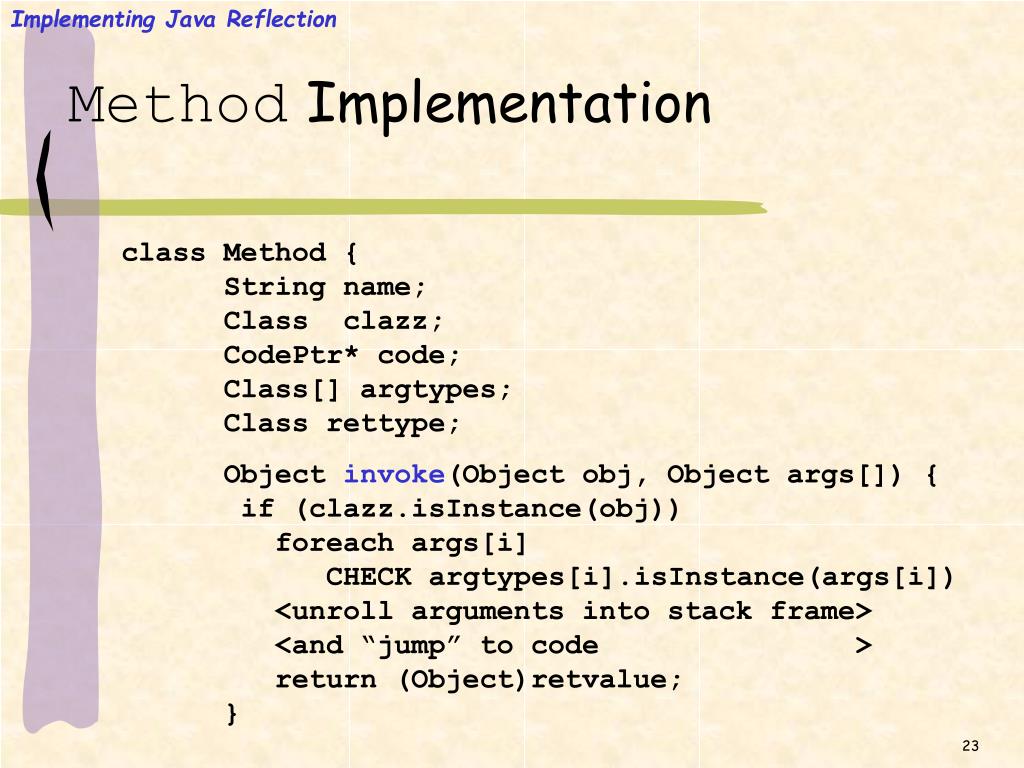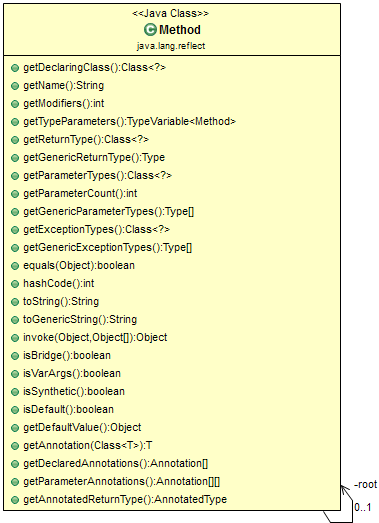
The following example shows the usage of .invoke(Object obj, Object.
#INVOKE METHOD IN JAVA REFLECTION EXAMPLE HOW TO#
NullPointerException − if the specified object is null and the method is an instance method.ĮxceptionInInitializerError − if the initialization provoked by this method fails. in The Fresh Writes ResponseBodyAdviceThe method creates a FileHandler to write logs to a specific file. The basic steps of the example are described below: The call (String arg1, Object arg2) method of the class takes a String argument and an Object argument and returns a boolean value. param params the parameters of the method. We have implemented the LogMethodCall Class, with a simple method to log its messages. param paramClasses the types for each parameter.


param methodName the name of the method that we would like to invoke. This method is required to invoke the appropriate build method as instructed by the builder XML file. InvocationTargetException − if the underlying method throws an exception. / Given the name and parameters, invoke the method in the builder. IllegalArgumentException − if the method is an instance method and the specified object argument is not an instance of the class or interface declaring the underlying method (or of a subclass or implementor thereof) if the number of actual and formal parameters differ if an unwrapping conversion for primitive arguments fails or if, after possible unwrapping, a parameter value cannot be converted to the corresponding formal parameter type by a method invocation conversion. IllegalAccessException − if this Method object is enforcing Java language access control and the underlying method is inaccessible. List methods of a class using Reflection 2. Let’s understand Reflection in Java with a simple example: // With reflection to instantiate an object Object foo Class.forName(''). The result of dispatching the method represented by this object on obj with parameters args. Invoke a method with parameter : Method Reflection Java Tutorial 1. invoke () function to invoke the method on an object. Obj − the object the underlying method is invoked from.Īrgs − the arguments used for the method call. Invoking method with its name Using the Java Reflection API, you can call a method by name by using the Class.getMethod () function to get a Method object and then calling the Method object. Throws IllegalAccessException, IllegalArgumentException, Additionally, we can instantiate new objects, invoke methods and get or set field values using reflection. Declarationįollowing is the declaration for .invoke(Object obj, Object.

Individual parameters are automatically unwrapped to match primitive formal parameters, and both primitive and reference parameters are subject to method invocation conversions as necessary.

The MHs that are created are usually a more efficient way to access the underlying methods. static void invokeSetterMethod ( Object target, String name, Object value) Invoke the setter method with the given name on the supplied target object with the supplied value. We can access them using its class object, and invoke the method by using the. For example, a reflective Method object can be converted to an MH using Lookup.unreflect (). Invoke the method with the given name on the supplied target object with the supplied arguments. args) method invokes the underlying method represented by this Method object, on the specified object with the specified parameters. We can access the private methods and variables of a class using Reflection. So, let’s benchmark different approaches, such as reflection, method handles, and code generation.The .invoke(Object obj, Object. In the above code snippet, in first example of Java Reflection fromName method returns the book Class object which uses the newInstance method to. And, it can directly influence their performance. What is the fastest way to read a getter from a Java class without knowing the class at compilation time? Java frameworks often do this - a lot.


 0 kommentar(er)
0 kommentar(er)
